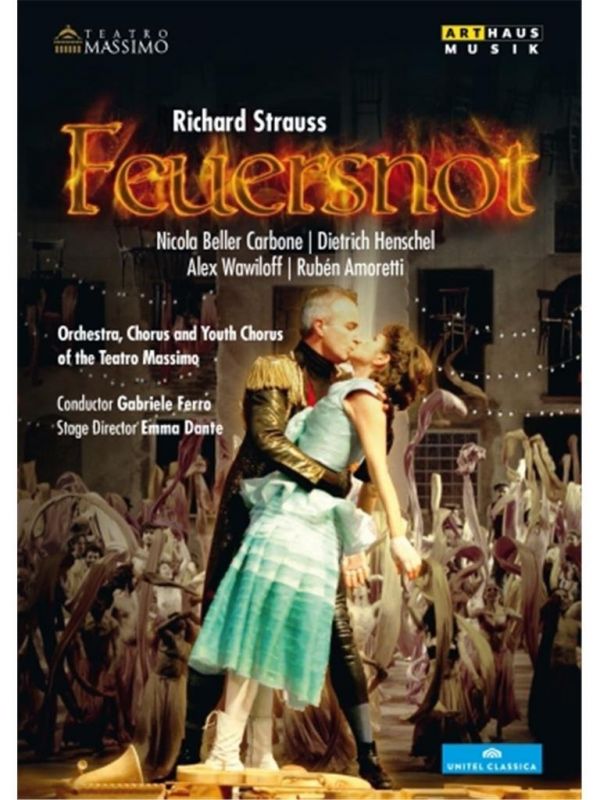STRAUSS Feuersnot
View record and artist detailsRecord and Artist Details
Composer or Director: Richard Strauss
Genre:
Opera
Label: Arthaus Musik
Magazine Review Date: 08/2015
Media Format: Digital Versatile Disc
Media Runtime: 113
Mastering:
DDD
Catalogue Number: 109 065

Tracks:
| Composition | Artist Credit |
|---|---|
| Feuersnot |
Richard Strauss, Composer
Alex Wawiloff, Schweiker von Gundelfingen, Tenor Dietrich Henschel, Kunrad, Baritone Gabriele Ferro, Conductor Nicola Beller Carbone, Diemut, Soprano Palermo Teatro Massimo Children's Chorus Palermo Teatro Massimo Chorus Palermo Teatro Massimo Orchestra Richard Strauss, Composer Ruben Amoretti, Ortolf Sentlinger, Bass |
Author: Hugo Shirley
I only wish I could be a little more enthusiastic about the performance itself, the mood for which is set by drawn-out faffing on the stage from before the orchestra even take their places. Dietrich Henschel’s Kunrad is established in this dumb show as a composer – this ‘magician’ is a thinly veiled portrait of Strauss – dropping sheets of manuscript paper into the pit, while a vast troop of actors parade around on the stage. The music starts only after a full 10 minutes of this, but the actors remain, gurning, flouncing and miming distractingly throughout. They make this olde-worlde Munich square resemble the 21st-century Covent Garden piazza, distract focus from the principals (there’s a tendency for narratives to be exaggeratedly enacted by the actors and dancers) and obscure Carmine Maringola’s essentially attractive set – an advent calendar-like facade more redolent, admittedly, of Sicily than Bavaria.
There are moments when Emma Dante’s direction unnecessarily confuses the action, too: Diemut comes down from her room upon Kunrad’s arrival there, having to make her own ascent to rejoin him; the townsfolk have all dissipated (to make way for dancers) by the time the pair emerge triumphantly from their love scene, so there’s no climactic cheer from them. The excessive busyness of it all, meanwhile, seems out of tune with the relaxed joviality of much of the music – some frantic dancing to the pre-Rosenkavalier waltzes is especially jarring.
Gabriele Ferro’s conducting is perfectly decent, while there’s lively work from the children’s chorus especially, giving lie to the idea that their part is too difficult to be practicable. It’s difficult to warm to Henschel’s dry-voiced and charmless Kunrad, however. The German baritone gets through the role effortfully, projecting more anger than ardency in his manner – listen to Bernd Weikl on the Fricke recording (Acanta, 1/85) for something a great deal sunnier, or even Markus Eiche on the CPO set. Nicola Beller Carbone is no match for Simone Schneider on the latter, either, her singing rather raw, though undeniably powerful. The extended cast does a decent job, but with varying levels of German.
With so much going on all the time, Tiziano Mancini’s video direction inevitably has to jump about a bit, lest we miss anything – to tiring effect. It’s useful to have this release, then, but it could have done a lot more to help the cause of this important work.
Discover the world's largest classical music catalogue with Presto Music.

Gramophone Digital Club
- Digital Edition
- Digital Archive
- Reviews Database
- Full website access
From £8.75 / month
Subscribe
Gramophone Full Club
- Print Edition
- Digital Edition
- Digital Archive
- Reviews Database
- Full website access
From £11.00 / month
Subscribe
If you are a library, university or other organisation that would be interested in an institutional subscription to Gramophone please click here for further information.




